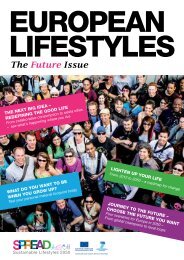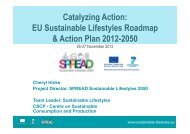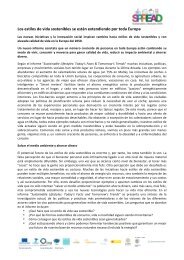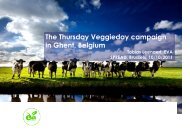closing conference report [PDF] - SPREAD Sustainable Lifestyles ...
closing conference report [PDF] - SPREAD Sustainable Lifestyles ...
closing conference report [PDF] - SPREAD Sustainable Lifestyles ...
You also want an ePaper? Increase the reach of your titles
YUMPU automatically turns print PDFs into web optimized ePapers that Google loves.
<strong>SPREAD</strong> <strong>Sustainable</strong> <strong>Lifestyles</strong> 2050Workshop Series “Enablers” of the <strong>Sustainable</strong><strong>Lifestyles</strong> Roadmap1) Workshop “Activating the GOVERNANCE AND POLICY Pathway to <strong>Sustainable</strong> <strong>Lifestyles</strong>”Moderator: Leida Rijnhout, ANPEDSpeakers: Gunilla Blomquist (Swedish Ministry of the Environment) Jan Juffermans (Ecological Footprint Network) Mathijs Buts (Federal Planning Bureau, Task Force <strong>Sustainable</strong> Development)Gunilla Blomquist (Swedish Ministry of Environment)“The roadmap focuses on ways to overcome the difficulties and challenges that individuals andinstitutions have had trying to achieve more sustainable lifestyles. A number of actions are notpolitically feasible today - but that was not the purpose of the project – it provides a vision toinspire possible actions and new solutions.” Ms. Blomquist explained that as enablers, governments needto provide supportive infrastructure, a good institutional framework and responsible leadership towards longtermgoals. She also talked about the need for social innovation, policy coherence, education, economicincentives, information and work on values and attitudes. Finally, Ms. Blomquist challenged the group to thinkabout how to encourage politicians to be brave enough to take this <strong>Sustainable</strong> <strong>Lifestyles</strong> Roadmap as a policyinstrument.Jan Juffermans (Ecological Footprint Network)“We need to move from measuring global ecological space per person to the next step: a fair earthshare for everyone.” Mr Juffermans quoted a range of UN <strong>report</strong>s to say that around 20% takes 80% and headded that there’s a growing attention for fair sharing. He believes that as prices for food, water and energy goup, more people will ask for fair shares creating the need for quotas. “For the time being we can dodamage control like starting a footprint tax on products and services.” He sketched the developmentof the quota idea since it was first launched in the 1990s.Mathijs Buts (Federal Planning Bureau, Task Force <strong>Sustainable</strong> Development)Mr Buts outlined three best practices from Belgium that could be considered more broadly across Europe:1: The Belgian Federal <strong>Sustainable</strong> Development Strategy. This is based on the Rio 1992 Earth Summit,translated into a federal act in 1997 and it was reviewed in 2010. Its indicators show that Belgium booked 12fast progresses, 8 slow progresses and 5 declines.2: The sustainable impact assessment (SIA). In theory this is applicable to all files for our council of ministersbut in practice most files are exemptions, some have a quick scan and the SIA was made on one file only, sofar.3: The adoption of a long-term vision (2050) on <strong>Sustainable</strong> Development for the Federal Government thatdirects learning cycles.Final Conference Report 26


![closing conference report [PDF] - SPREAD Sustainable Lifestyles ...](https://img.yumpu.com/42874652/26/500x640/closing-conference-report-pdf-spread-sustainable-lifestyles-.jpg)




